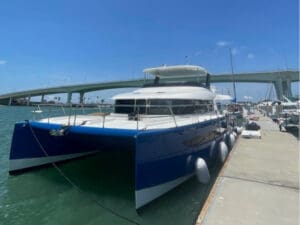We are often asked about applicable taxes in Europe for boat owners because there is a lot of confusion surrounding VAT Tax. While buying a yacht outside the US has benefits for some, it also has lots of complexities and nuances that you are probably less familiar with. So, if you are planning to buy a boat in Europe, make sure you understand the tax implications, especially if you plan to cruise in Europe for an extended period of time. Here we share information that will offer you guidance on the right questions to ask. Always employ a tax professional, legal counsel, and other assistance to ensure you are getting the correct guidance for your specific situation.

vat tax on a yacht in the european union
- All EU residents who own a boat and use the boat within the EU are required to pay a 20 % Value Added Tax (VAT), which will hike up the sales price considerably. It’s important not to underestimate the complexity of VAT on vessels, especially for higher value yachts. As a matter of course when you check into an EU country or when you sell the boat, you will be required to provide evidence of VAT paid much like a Federal Duty paid certificate in the US.
- For non-EU residents, the laws state that they are permitted to use privately owned yachts in the Mediterranean under “Temporary Admission” for up to 18 months without being liable to pay VAT. So if you want to cruise in the Mediterranean for a few months after taking possession, you can temporarily import the boat for up to 18 months.
- If you are planning to transfer residence to the EU and it coincides with the permanent importation of the boat, you may be eligible for VAT relief.
- After extended cruising outside the EU, a VAT paid boat exported from the EU may also qualify for relief on its return if it’s returned to the EU within three years of export. It must be imported by the person who exported it from the EU and cannot have significant upgrades that will increase its value substantially.
- Boats that are kept outside the EU for more than three years may be required to pay VAT again so be careful about keeping good records.
- A VAT paid boat could lose its VAT paid status if it’s sold outside the EU and VAT must then be paid if the boat is brought back into the EU, even if the buyer and seller are EU residents.
- A European Union (EU) resident who buys a new boat or a used boat for personal use that did not have VAT paid will be responsible to pay the VAT rate applicable at the place of delivery as well as transfer tax or import duties. However, if the boat is acquired for commercial purposes or leased, the rules apply differently.
- An off-shore registered yacht owned for commercial purposes in the Mediterranean is exempt from VAT, if the boat was imported into the Med per the applicable regulations.
It's All About Location
The location of the yacht, the residence of the buyer, and where the yacht will be operated as a business. Each aspect impacts not only taxes and duties at time of purchase, but also taxes related to collecting revenue. Some examples will help you better understand just how intricately entwined the location of the yacht, buyer, and business are:
- A European Union (EU) resident who buys a new boat or a used boat for personal use that did not have VAT paid will be responsible to pay the VAT rate applicable at the place of delivery as well as transfer tax or import duties. However, if the boat is acquired for commercial purposes or leased, the rules apply differently.
- An off-shore registered yacht owned for commercial purposes in the Mediterranean is exempt from VAT, if the boat was imported into the Med per the applicable regulations.
- Non-EU residents are permitted to use privately owned yachts in the Mediterranean under “Temporary Admission” for up to 18 months without being liable to pay VAT.
As you can see, to determine the appropriate legal and tax implications and rules you need to follow in your situation, it is vital to do deep due diligence to analyze the operational tax and flagging issues, cruising waters, nationality and residence of the vessel’s users, and any planned chartering operation.
*The information above is for general purposes only and should not be relied upon as a legal or tax advice.





